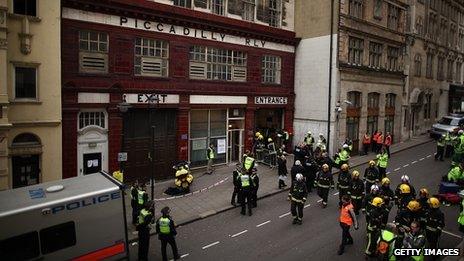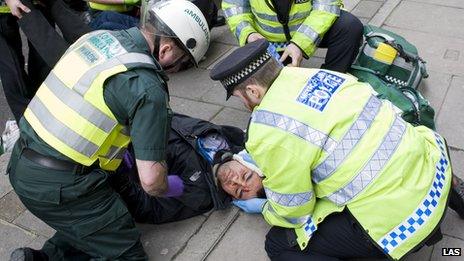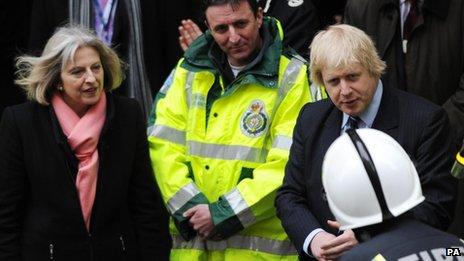London 2012: Olympics and Paralympics security test
- Published

Thousands of police officers will be on duty in London during the Olympic Games
A major exercise testing security and emergency services in the event of a terror attack during the Olympics and Paralympics has taken place.
About 2,500 personnel took part in the event in central London, which was to test their response to a simulated attack on the London Underground.
Some of the activities at the disused Aldwych underground station in Surrey Street have been visible to the public.
The organisers said they wanted to leave "nothing to chance".
Surrey Street was closed to traffic during the first stage of the two-day operation, entitled Exercise Forward Defensive.
"Passengers" were evacuated from the Tube in Surrey Street and the London Ambulance Service were at the scene as part of the exercise, the Metropolitan Policetweeted, external.
The London Fire Brigade also took part in the exercise.
The Metropolitan Police said the "live play elements" element of the exercise, which may have been visible to members of the public, ended at around 1500 GMT, although other parts of the procedure were set to go on behind the scenes.
Those involved were briefed that they were responding to a terror attack on the Tube network in August, in the midst of the Olympic Games.
The officer in charge of Olympic security, Metropolitan Police Assistant Commissioner Chris Allison, said the tests were "vital" to ensure the safety and security operations planned for the Games worked.
"We need to be confident that we have the right people in the right places, that we understand how others operate and that we are talking to each other at the right levels and in the right way," he said.
Speaking ahead of the exercise, he said the test would examine managerial roles as well as front-line services.
"The initial incident will test the tactical response including evacuation of the station, rescuing injured people and managing the crime scene," he said.
'Build confidence'
"The exercise will go on to test how senior decision makers manage the impact of the incident, the investigation to catch those responsible and a range of issues such as travel disruption, protest and organised crime which may impact on the smooth running of the Olympic Games."
Security minister James Brokenshire said the organisers wanted people to remember the Olympics for the sport and not for the high level of security which has been put in place.

The tests follow those carried out by police and military personnel on the River Thames last month
He said the exercise would "build confidence" in the UK's security operation plans and added: "We are determined to leave nothing to chance to deliver a safe and secure Games that London, the UK and the world can enjoy."
Assistant Commissioner Cressida Dick took a lead role during the exercise as part of her preparations for the Olympics later in the year.
She said: "I will oversee all national counter-terrorism and domestic extremism policing during this summer."

Home Secretary Theresa May and London Mayor Boris Johnson also took part in the drill
She said all those involved would work closely together but the test was not in response to any specific identified terror threat.
"Exercise Forward Defensive will focus on the extreme end of what may happen, it is not being carried out in response to any specific intelligence and the scenario has been planned for many months," she said.
She added: "We want to reassure everyone that we will leave nothing to chance in our aim to deliver a safe and secure Games, whilst keeping London and the UK safe and secure."
Mayor of London Boris Johnson said the "extraordinary level of planning" would reassure the world London was ready for the Games.
This week's tests follow those carried out by police and military personnel on the River Thames last month.
Almost nine million tickets are being sold for Olympic events, with more than 10,000 athletes taking part.
In December ministers almost doubled the security budget for the Games from £282m to £553m.
- Published21 February 2012
- Published20 February 2012